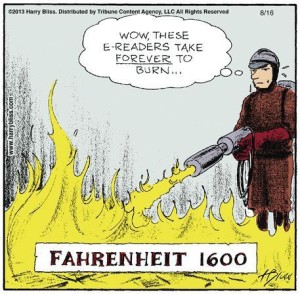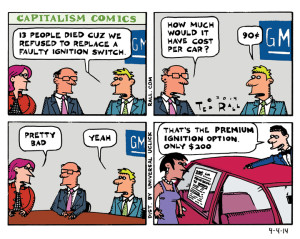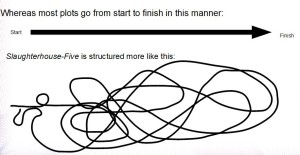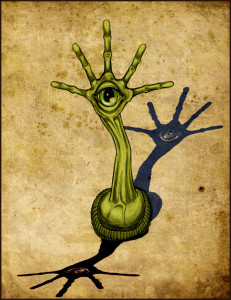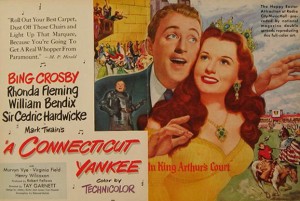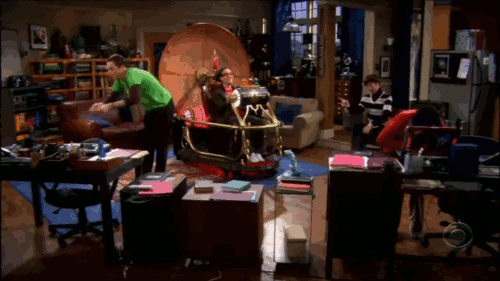6 Protagonists with Awesomely Awful Day Jobs
By Tiffany Foster
For anyone who has ever had a boring job, here are six protagonists who definitely know how that feels.
#6. Nick Caraway from The Great Gatsby
Bond salesman
Nick Carraway’s job as a bond salesman is so boring that we barely hear anything about his job after the first chapter of the novel. He initially seems excited about bonds, but over the course of the text, he becomes much more interested in his obscenely rich and good-looking neighbor, Jay Gatsby. Gatsby eventually tries to get Nick into business with him to repay him for arranging an affair between Nick’s cousin, Daisy, and him.
Nick declines the (obviously illegal) job offer, but we’re still not so sure he’s as moral as he thinks he is.
#5. Danny “Creds” Shapiro from Creds: The I.R.S. Adventure
I.R.S. Taxpayer Service Representative
Danny has a dream to one day become an I.R.S. field agent, but to get his foot in the door, he starts out as a Taxpayer Service Representative, which is the equivalent of being a customer service representative in Hell. No one likes the I.R.S., but they especially hate the I.R.S. when they have a problem and are transferred to a person who knows next to nothing about taxes, which is typically the case.
Danny takes the job head-on and learns more than everyone else in his department in a couple of weeks, eventually rising to his dream job as a Revenue Agent where he now has a target on his back.
#4. Guy Montag from Fahrenheit 451
Firefighter who starts fires.
![]() In the dystopian society he lives in, firefighters are responsible for burning any books they can find – essentially every pyromaniacal, book-hating child’s dream job.
In the dystopian society he lives in, firefighters are responsible for burning any books they can find – essentially every pyromaniacal, book-hating child’s dream job.
However, for anyone who values original thought and the future of humanity, this is a living nightmare. Guy’s world is distracted and consumed by, admittedly, the most boss home theaters you’ve ever seen – apart from the nursery in “The Veldt” – so no one thinks critically about the world around them anymore; they just disappear into their fantasy world.

For a man who feared the influence of television as much as Bradbury did, he sure came up with some awesome ideas that I’m sure Apple is working on.
If all of this isn’t bad enough, the firefighters sometimes commit casual murder when closet bibliophiles refuse to leave their beloved books behind. Curiosity gets the better of Guy eventually, and in a moment of spontaneous defiance, Guy finds himself snatching a book before setting a house, and its owner, ablaze.
Luckily, Guy eventually rejects his society and joins the book people in the forest, where they dream of a world in the future where books are printed again.
#3. Winston Smith from 1984
Writes lies for the Ministry of Truth.
Another ironic job position in a dystopian society, Winston works in the Records Department of the Ministry of Truth rewriting newspaper articles and other documents to ensure that the government is always right.
This proves to be a difficult job considering the government is almost always wrong and changes well-known facts at the drop of a hat, including erasing people from history, faking economic success, and changing which country they’re currently at war with.
Winston begins a heroic journey in search of the truth; however the lies run so deep Winston hits rock bottom first.
#2. The Narrator from Fight Club
Automotive Recall Coordinator
In Fight Club, the narrator’s job could easily be described as the Devil’s number cruncher.
Basically he decides when it’s worth it for a car company to save people’s lives and when doing that costs too much money. If you think this sounds familiar, it’s because GM got caught doing this two years ago.
For my math nerds out there, the math equation our narrator uses to determine whether to recall cars or commit passive mass murder is alarmingly simplistic. So not only is his job completely evil, but a middle school student could do it.
I don’t think it gets much worse than selling your soul for your silence. Ultimately, our narrator blackmails his boss for the most baller severance package ever, but it probably would’ve been better to see him go public.
Honorable mention:
As a night job, he works as a projectionist in a movie theater, where his favorite hobby is to splice porn into family films.
#1. The Hunger Artist from “A Hunger Artist”
Literally a starving artist.
By far the worst job ever has to be starving yourself for people’s entertainment. The hunger artist prides himself on his ability to fast for forty days at a time in the circus he works for. People come and stare in wonder at his emaciated form. Surprisingly, the hunger artist loves his job and is completely devoted to it . . . until people stop caring about him. His cage becomes ignored and he fasts endlessly – well beyond the forty day mark.
This guy takes the idea of a starving artist to an incredibly literal level, and for that, he definitely gets the number one spot.




